Check Point® Software Technologies Ltd.(link is external) announced major advancements to its family of Quantum Force Security Gateways(link is external).
The evolution of APIs has dramatically changed the software development process, necessitating companies to rethink how they manage and organize all of the APIs at the core of their business. Recent surveys by RapidAPI (conducted at the end of 2021) found API adoption increased across all industries, with executives prioritizing investments in the API economy as an essential strategy to secure organizations’ future revenue and growth.
Across both surveys, several key points emerged that affirm a growing reliance on APIs to improve efficiencies and enable innovation.
1. Reliance on APIs Grows Among Both Developers and Enterprise Leaders
The survey confirms what many developers already expected to see — API usage continues to grow rapidly. When asked to predict their API usage in 2022, 90.5% of developers expect to use APIs more or the same as in 2021, while only 3.8% of developers think they will use fewer APIs in 2022.
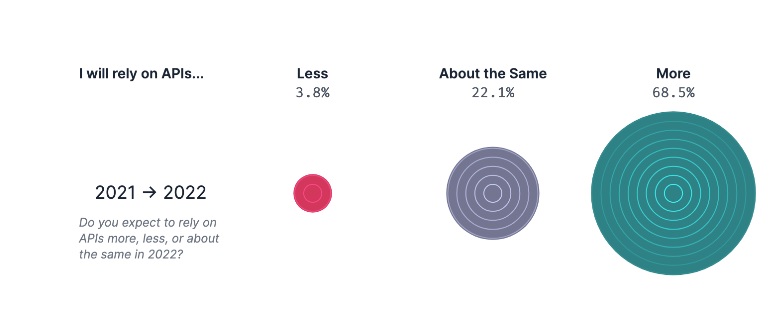
Data showed an increase in API usage and reliance across all industries in 2021. When we take a closer look, the three industries with the highest percentage of developers who expect to rely on APIs more in 2022 than 2021 are Healthcare (71%), Technology (69%), and Financial Services (68%)
2. 98% of Enterprise Leaders Agree APIs are an Essential Part of an Organization’s Digital Transformation
Developers aren’t the only group expecting to rely on APIs in 2022. Over 98% of enterprise leaders say APIs are a critical part of their digital transformation efforts, and 97 percent agree that successfully executing an API strategy is essential to secure organizations’ future revenue and growth.
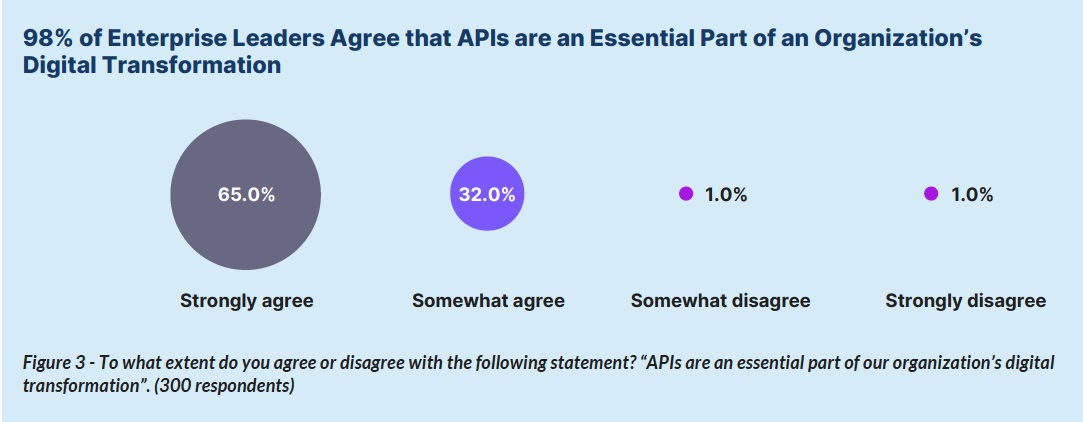
Enterprise leaders realize the breadth of benefits APIs can bring, from enabling innovation to strengthening collaboration. The top five benefits organizations hope to see by leveraging APIs include:
1. A smoother customer experience (49%).
2. Accelerated innovation (48%).
3. Better collaboration among internal development teams (42%).
4. Enabling joint-development with partners and third-party development teams (41%).
5. Improved developer experience (38%).
3. Organizations Leveraging APIs to Enhance Collaboration
Improving partner collaboration is a prominent goal for organizations in 2022. Over 84% of enterprise leaders indicated it was “extremely” or “very” important to partner with other organizations that provide APIs. Additionally, nearly two-thirds (65%) of organizations rely on APIs to improve collaboration with partners and enable partner innovation.

4. Organizations Expand API Usage to Broaden Ecosystems
Third-party and partner-facing APIs have grown in popularity as organizations prioritize partnerships with other organizations. Internal APIs were still the most common API type developers reported working on for their organization. However, compared to 2020, more developers reported working on partner-facing or third-party APIs in 2021.
The type of APIs were defined in the survey as follows:
■ Internal: APIs for organization use.
■ External/Third-Party: APIs developers or organizations subscribe to.
■ Partner-Facing: APIs an organization exposes for others to use.
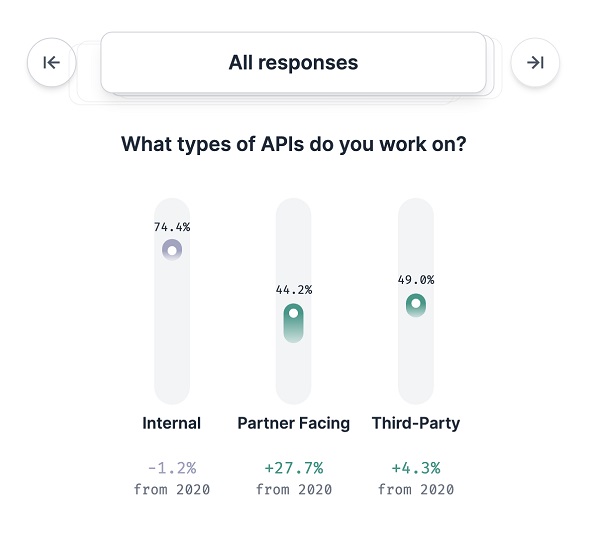
The percentage of developers who reported working on partner-facing APIs was the most noticeable increase across all categories, increasing almost 30% (from 34.6% to 44.3%).
5. Adoption and Exploration of New API Technologies Accelerates
Compared to previous years, API technology is becoming more varied. Of the trends surveyed, REST continues to be the most popular. However, the number of developers using REST in production fell slightly between 2020 and 2021. In contrast, GraphQL and Async API adoption has dramatically increased in the last several years. There continues to be strong interest in other types of emerging technology, including Serverless & FaaS, Websockets, and gRPC.
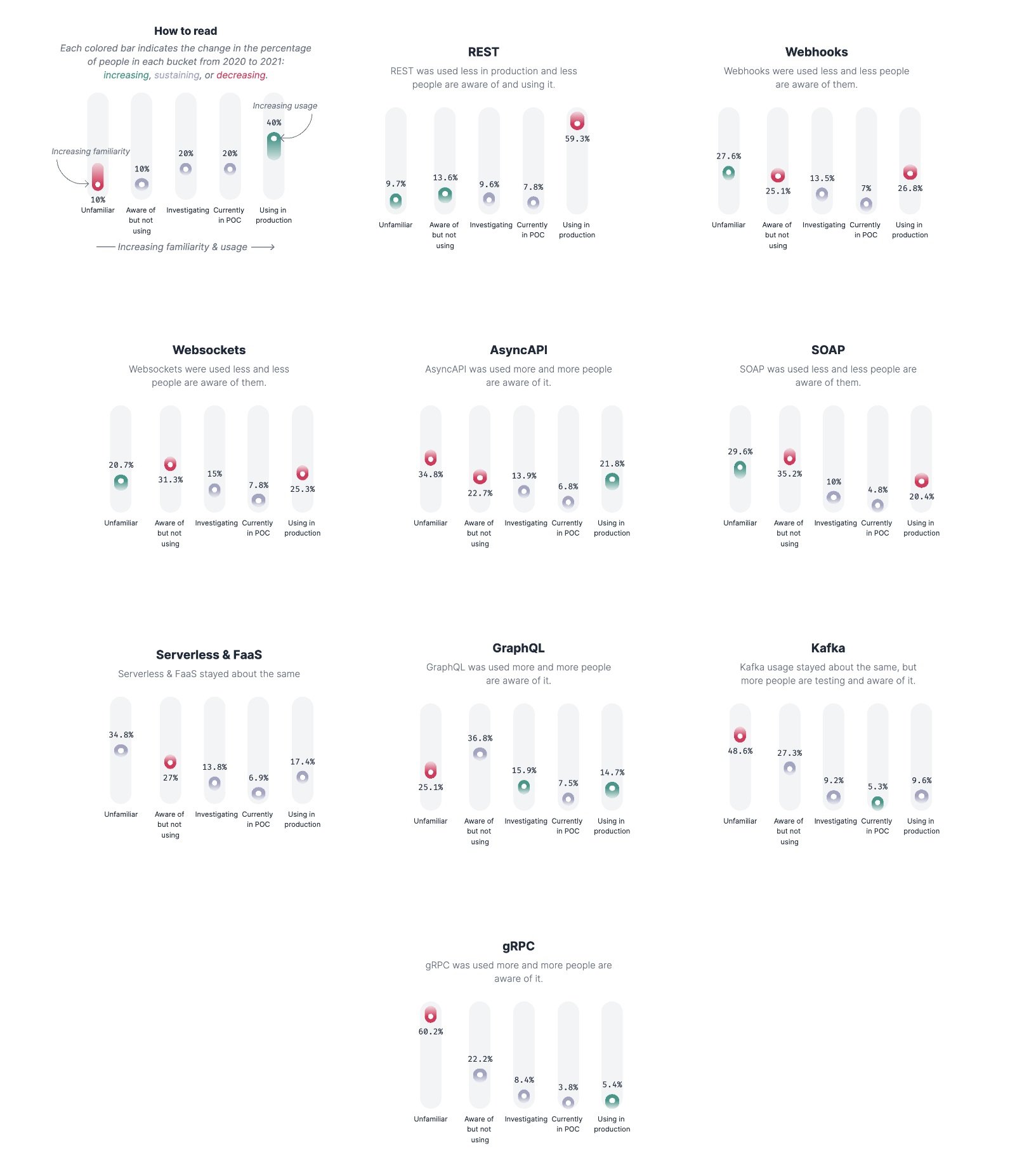
6. JavaScript Continues to Dominate, and TypeScript Enters the Top 5 Programming Languages
JavaScript continues to dominate as the most used programming language and the most preferred programming language. Compared to the previous two years, JavaScript usage and preference modestly increased in 2021.
More notably, TypeScript entered both the top 5 most used programming languages and the top 5 most preferred languages for the first time in any of our surveys. Older languages, such as Java, PHP, C#, and .NET fell in popularity and preference.
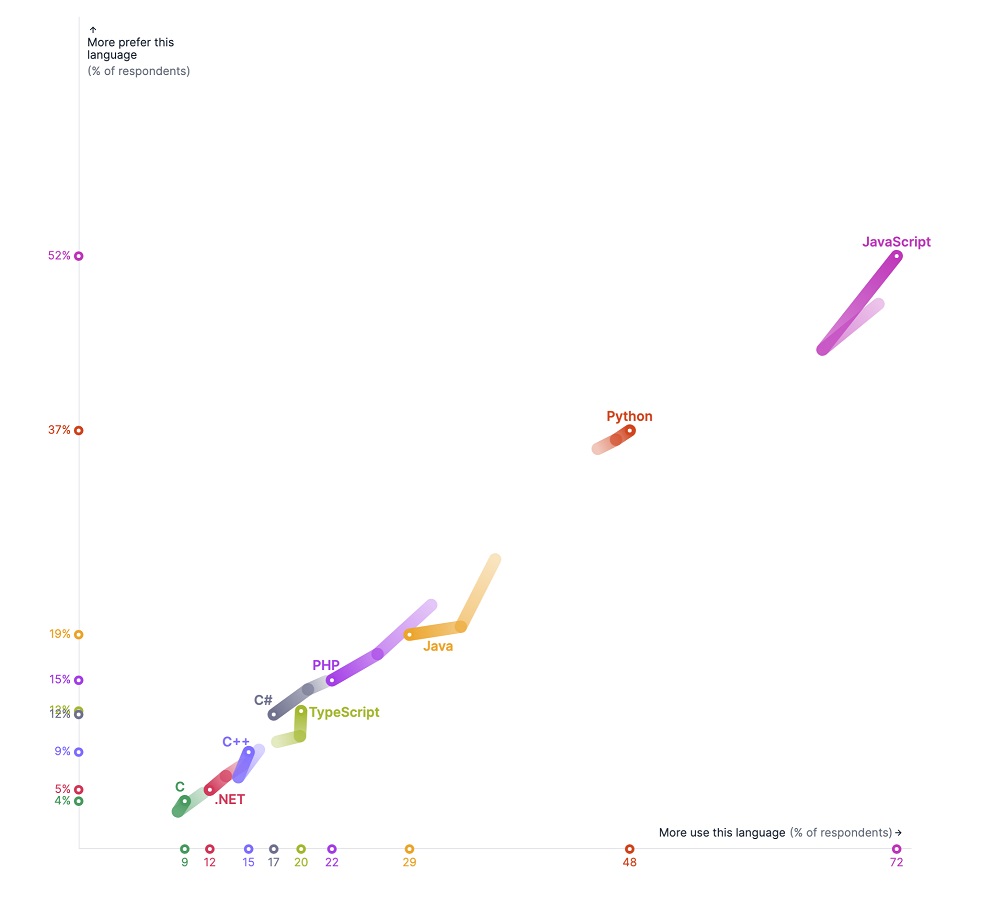
7. More Than Half of Developers Considered Leaving Their Job
Based on the overall turbulence seen in the job market through 2021, it is not a surprise that 54% of developers considered leaving their current position.
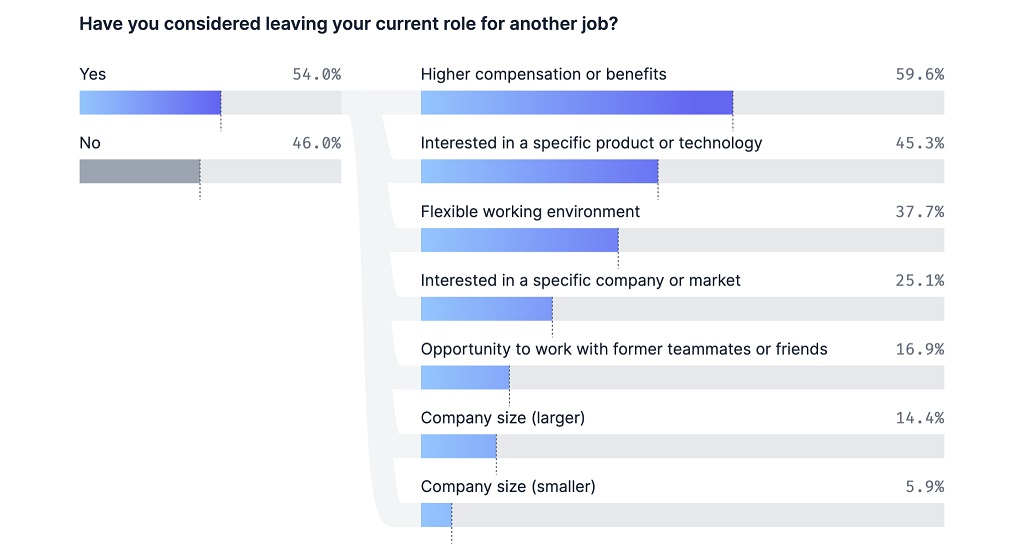
The top three reasons developers considered leaving their position were for higher compensation or benefits, an interest in a specific product or technology, and a desire for a flexible work environment.
Final Thoughts
2021 proved the road ahead is unpredictable and uncertain. It also proved that APIs and microservices are here to stay, and continued investment in these areas will be the key for many companies to navigate 2021 and beyond.
For more insights, check out the interactive website for the State of APIs Developer Survey, and the State of Enterprise APIs.
Methodology: The State of APIs Developer Survey received responses from over 130 different countries. Most of the respondents were professional developers with over 90 percent reporting that they program as part of their job or education. Respondents represented a wide variety of industries and company sizes. The State of Enterprise APIs survey was commissioned by RapidAPI though Vanson Borne. It surveyed 300 global IT leaders for insights into their organizations’ APIs and API strategy. Respondents’ organizations spent at least $500,000 per year on APIs and API infrastructure to qualify for participation. Organizations were based in the US, UK, Germany, and France from private sectors with 1000+ employees.
Industry News
Sauce Labs announced the general availability of iOS 18 testing on its Virtual Device Cloud (VDC).
Infragistics announced the launch of Infragistics Ultimate 25.1, the company's flagship UX and UI product.
CIQ announced the creation of its Open Source Program Office (OSPO).
Check Point® Software Technologies Ltd.(link is external) announced the launch of its next generation Quantum(link is external) Smart-1 Management Appliances, delivering 2X increase in managed gateways and up to 70% higher log rate, with AI-powered security tools designed to meet the demands of hybrid enterprises.
Salesforce and Informatica have entered into an agreement for Salesforce to acquire Informatica.
Red Hat and Google Cloud announced an expanded collaboration to advance AI for enterprise applications by uniting Red Hat’s open source technologies with Google Cloud’s purpose-built infrastructure and Google’s family of open models, Gemma.
Mirantis announced Mirantis k0rdent Enterprise and Mirantis k0rdent Virtualization, unifying infrastructure for AI, containerized, and VM-based workloads through a Kubernetes-native model, streamlining operations for high-performance AI pipelines, modern microservices, and legacy applications alike.
Snyk launched the Snyk AI Trust Platform, an AI-native agentic platform specifically built to secure and govern software development in the AI Era.
Bit Cloud announced the general availability of Hope AI, its new AI-powered development agent that enables professional developers and organizations to build, share, deploy, and maintain complex applications using natural language prompts, specifications and design files.
AI-fueled attacks and hyperconnected IT environments have made threat exposure one of the most urgent cybersecurity challenges facing enterprises today. In response, Check Point® Software Technologies Ltd.(link is external) announced a definitive agreement to acquire Veriti Cybersecurity, the first fully automated, multi-vendor pre-emptive threat exposure and mitigation platform.
LambdaTest announced the launch of its Automation MCP Server, a solution designed to simplify and accelerate the process of triaging test failures.
DefectDojo announced the launch of their next-gen Security Operations Center (SOC) capabilities for DefectDojo Pro, which provides both SOC and AppSec professionals a unified platform for noise reduction and prioritization of SOC alerts and AppSec findings.
Check Point® Software Technologies Ltd.(link is external) has been recognized on Newsweek’s 2025 list of America’s Best Cybersecurity Companies(link is external).
Red Hat announced enhanced features to manage Red Hat Enterprise Linux.




